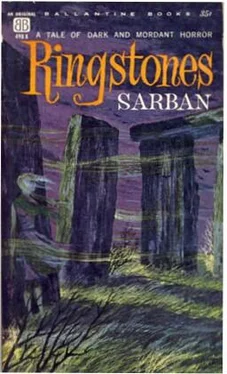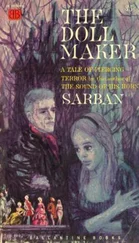Сарбан - Ringstones
Здесь есть возможность читать онлайн «Сарбан - Ringstones» весь текст электронной книги совершенно бесплатно (целиком полную версию без сокращений). В некоторых случаях можно слушать аудио, скачать через торрент в формате fb2 и присутствует краткое содержание. Жанр: Ужасы и Мистика, на английском языке. Описание произведения, (предисловие) а так же отзывы посетителей доступны на портале библиотеки ЛибКат.
- Название:Ringstones
- Автор:
- Жанр:
- Год:неизвестен
- ISBN:нет данных
- Рейтинг книги:3 / 5. Голосов: 1
-
Избранное:Добавить в избранное
- Отзывы:
-
Ваша оценка:
- 60
- 1
- 2
- 3
- 4
- 5
Ringstones: краткое содержание, описание и аннотация
Предлагаем к чтению аннотацию, описание, краткое содержание или предисловие (зависит от того, что написал сам автор книги «Ringstones»). Если вы не нашли необходимую информацию о книге — напишите в комментариях, мы постараемся отыскать её.
Ringstones — читать онлайн бесплатно полную книгу (весь текст) целиком
Ниже представлен текст книги, разбитый по страницам. Система сохранения места последней прочитанной страницы, позволяет с удобством читать онлайн бесплатно книгу «Ringstones», без необходимости каждый раз заново искать на чём Вы остановились. Поставьте закладку, и сможете в любой момент перейти на страницу, на которой закончили чтение.
Интервал:
Закладка:
“When was it?” he said. “About four weeks ago? Yes. My wife was taking the children off to her sister's in Sheepcar for the day. It was a Sunday. Daphne and I decided we would walk over the moor, have a look at Ringstones, and come back by the evening bus from Blagill. I hadn't been over for years before then, and I found that the path had got so overgrown that it was a hard job to follow it. In fact, though I couldn't very well admit it at the time, I got well and truly lost. On my native heath! However, I knew that if we only kept on long enough I should see something that I knew, and Daphne's a bonny walker, so, after some hard going over the heather and mosses, we did in the end sight the Standing Stones—the Ringstones, you know, that the place is called after. That was fine. No danger of going wrong from there; but, just as we were getting to them, Daphne put her foot in a hole and came an awful cropper. When I picked her up I found she'd sprained an ankle and cut her left wrist quite deeply by coming down with her hand among the stiff heather stalks. It was rather a fix. The day had turned very dull. I thought we were likely to have a thunderstorm. There's no shelter at all up there. Well, of course, you know that. There was no question of her being able to walk to Blagill with that ankle, and though, of course, I gallantly offered to carry her the remaining four miles, she made such objections to that that I didn't.”
“Yes, I could see you carrying my nine stone all that way!” cried Daphne.
“Pooh!” said the little doctor. “I'd have tossed you over my shoulder like a roll of bedding. It was your dignity I was thinking about. Well, the only thing was to get Daphne down to the Hall, where she'd be sheltered a bit if it did rain, while I went off to Blagill to find some transport. I'm afraid we didn't improve the ankle getting down the hill, and it caused Daphne great pain. However, we got there. The door was open, I settled Daphne down on the bottom stair inside the front hall, got some water and bathed and bandaged her ankle and wrist with our handkerchiefs and then set off for Blagill as hard as I could go.”
“Just fancy!” Mrs. Hancock appealed to us. “Leaving the poor girl all alone there in that lonely old place, miles from anywhere. And after all the tales you'd been telling her about the Polish girl, too.”
“What had that to do with it?” demanded the doctor.
“Something, I think,” said Piers, looking at Daphne, who, with brilliant eyes, was making the best of her embarrassment. “I should like to hear about her.”
“All right,” said Doctor Hancock. “As near as I can, I'll tell you. It happened while I was away in the Army... ”
Mrs. Hancock interposed. “I can tell that story better than you. I was here at the time. Some people called Roebuck who live at Towngate End took on a Polish maid in the last year of the war. It's my belief that the girl wasn't all there. She used to drive poor Mrs. Roebuck to distraction; she never understood a word the girl said and the girl, I expect, never understood anything they said to her. She was a fine−looking girl as far as figure went, but I always thought there was something wandering in her eyes. Well, one afternoon she went out for a walk and didn't come back. She hadn't turned up by the time it was dark, and Mrs. Roebuck rang me up and asked me what she ought to do. She was imagining all sorts of things, except the obvious one which, to my mind, was that Katia—that was the girl's name—had hopped off to Nettleworth, where the Polish troops were then. Well, she kept ringing me up at intervals until midnight, getting more and more worried: she'd telephoned the Polish camp, and Katia wasn't there, she'd telephoned the hospital and she'd telephoned the police, and she couldn't hear a word of the lass. Finally, I persuaded her to leave it to the police sergeant here and go to bed.
“However, before eight o'clock the next morning she rings me up in great agitation and says she's had a phone call from the Iddendens at Blagill and they've found Katia. Would I take her over in the car to collect her. I was doing W.V.S. work then. So off we went, Mrs. Roebuck and I, to Blagill. There was Katia in the Iddendens' kitchen, looking as wild as a witch; old George grinning all over his face, young Joe looking very sheepish and young Joe's missus not looking at all pleased. Katia was wearing some of Mrs. Iddenden's things, and when we asked where her own were there was a certain amount of embarrassment. But young Joe told me the whole tale next time he came into Staineshead. It appears he'd gone up on his pony early that morning to look after some bullocks they had in Ringstones Park. On his way back he saw something white lying between those standing stones. Thinking it was a sheep that was sick, he rode over and then saw that it was a girl, stark naked, and, he said he thought at first, dead. But just as he came up, she sat up, gave one shriek and flew at him and clung to him for dear life. Poor Joe, he said all he could think of for a bit was that it was a good job there was nobody else about. However, he disentangled himself and gave her his coat and tried to tell her to stay there while he went and got his wife to bring her something to put on. But Katia wasn't having that He said she was terrified and he could make nothing of her, so, little as he liked the job, he put her on the pony and led her down to the farm and handed her over to his wife. He hadn't any idea who she was, but his wife, it seems, had heard that the Roebucks had a Polish maid, and as this seemed to be a foreigner she rang Mrs. Roebuck up.
“Well, of course, we tried to get out of Katia what had happened, but she'd lost whatever wits she ever had by then. She never had much English, and the most I could understand from her was that she'd met some people she called 'little men' and they'd played tricks on her and taken her clothes and kept her all night at the old Hall. She had obviously had a bad fright of some sort, but she didn't seem to have come to much bodily harm, except for a lot of bruises which, I suppose, she'd got through tumbling about the hillside in her birthday suit.
“The fact that she had been down to the Hall was proved when Joe Iddenden a day or two later turned up with her clothes. He'd found them somewhere among the old buildings belonging to the Hall. Katia, of course, was quite barmy. The Roebucks couldn't keep her and so they asked the Poles to collect her. But, bless my soul! they'd scarcely arranged with the Polish doctor at the camp to come and fetch her when off she flitted again. And this time they never did find her, though they got the police and the Home Guard and the Polish troops and the boy−scouts and everybody in three parishes scouring the moors for days. If she ever was found it wasn't in this neighbourhood, and nobody here has heard tell of her from that day to this.”
“And, you know,” broke in the doctor, hardly waiting for his wife to finish, “you wouldn't believe it in these days of popular science and the pictures, but somebody dropped a dark hint about the Duergar, and somebody else said, well, the Stone Circle always had been reckoned an uncanny place... ”
“The Duergar?” we asked.
“Yes. I shouldn't have thought there was anybody left in Northumberland who knew the name outside a book. But it's odd how these things do linger underneath. The Duergar's supposed to be the wild man of the moors who hunts people down and carries them off underground. I haven't heard his name mentioned since I was so high and my grandmother used to tell me fairy−tales.”
“Oh, that!” said Mrs. Hancock. “That's all a lot of silly nonsense. Somebody just said that for a joke. What I was meaning was that I shouldn't have been able to help thinking of that loony flitting about the place.”
Читать дальшеИнтервал:
Закладка:
Похожие книги на «Ringstones»
Представляем Вашему вниманию похожие книги на «Ringstones» списком для выбора. Мы отобрали схожую по названию и смыслу литературу в надежде предоставить читателям больше вариантов отыскать новые, интересные, ещё непрочитанные произведения.
Обсуждение, отзывы о книге «Ringstones» и просто собственные мнения читателей. Оставьте ваши комментарии, напишите, что Вы думаете о произведении, его смысле или главных героях. Укажите что конкретно понравилось, а что нет, и почему Вы так считаете.



